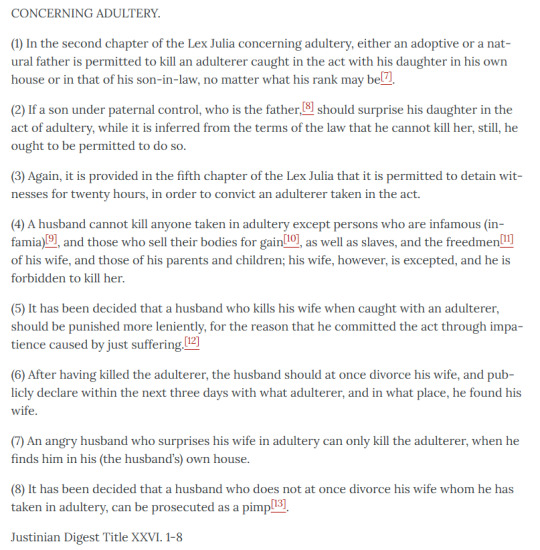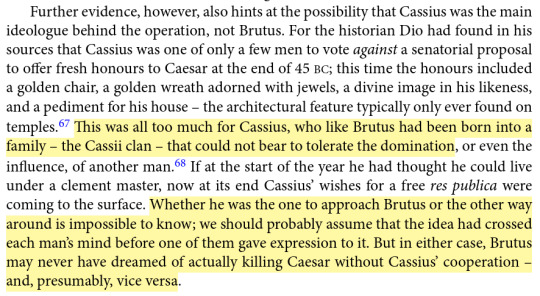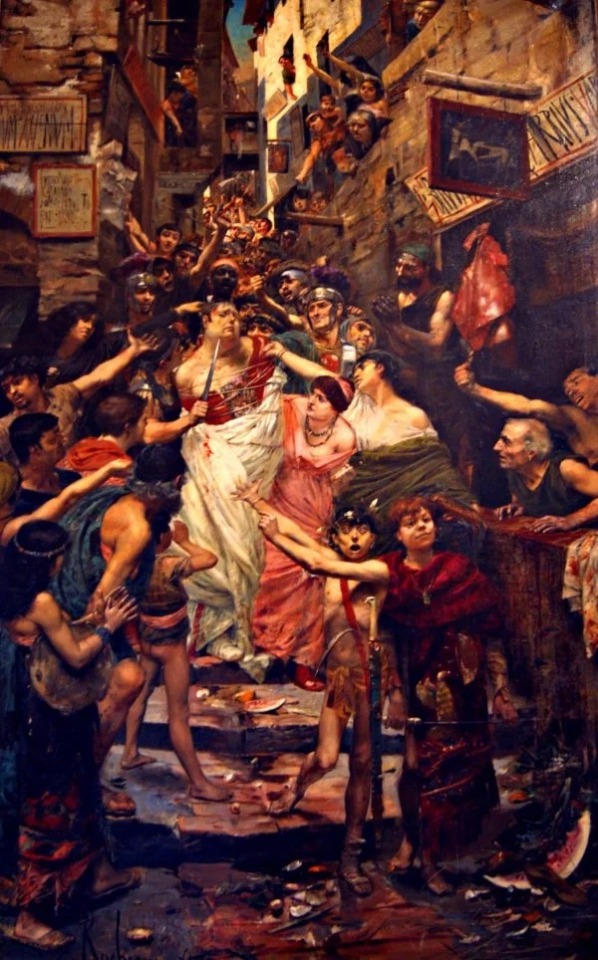#Roman Law
Text
New favorite Roman law: If Lucius Tiddlypuss steals your shit, you can have him flogged, but only if you search his house while almost naked and carrying a fancy plate first.


Behold: a detective.
592 notes
·
View notes
Text
For those of you following my posts on Medieval Law and how it pertains to the Arthurian Narrative - the Fall of Arthur, in particular - a critical scene from the original Vulgate Mort Artu needs to be understood:

So, this is the critical point which a lot of adaptations take for granted: Agravaine, Mordred and their lackeys didn't actually see Lancelot and Guinevere have sex.
All they could reasonably know is that Lancelot and Guinevere were in a locked room together for some time - suspicious but not conclusive. Especially in the context of previous arcs - The Sir Mador-Poison Apple incident and (in Le Morte) Meleagant/Knight of the Cart arc.
So as a result of this debacle, Agravain and Mordred have neither a) Physical Proof, nor b) eyewitnesses/visual confirmation of the crime.
So bottom line: Lancelot and Guinvere were NOT caught in flagrante delicto.
Really, what is more incriminating is Lancelot's slaying of his fellow knights, but even this complicated by that fact that Agravaine and his goons clearly came in armed (as in they came in wearing armor and had weapons) since Lancelot loots Tanaguin/Colgrevance's armor:


Le Morte is more explicit in the group being armed:

(Minor point to be noted is, as seen in Vulgate Cycle, Lancelot actually only killed two of the assailants and was very much measured. Why Stanzaic Morte Arthure and Thomas Malory magnified Lancelot's slaughter we can hazard why but that's not pertinent)
#sir lancelot#queen guinevere#king arthur#sir agravaine#sir mordred#vulgate mort artu#le morte d'arthur#sir thomas malory#medieval law#canon law#arthurian law#english law#french law#welsh law#roman law#stanzaic morte arthure#arthuriana#arthurian legends#arthurian literature#arthurian mythology
11 notes
·
View notes
Text
Was Numa Pompilius a legendary hero or a historical figure? The story of Numa Pompilius, the second legendary king of Rome and wise ruler, whose reign transformed the religious, social, and legal systems of ancient Rome.
#Numa#Roman#kings#Roman law#calendar#rulers#religion#Rome#Roman Kingdom#Other Roman Leaders#ancient#history#ancient origins
24 notes
·
View notes
Text

Patreon
#studyblr#notes#history#historyblr#history notes#world history#world history notes#western civ#western civilization#western civ I#western civ 1#justinian#emperor justinian#roman history#classical studies#roman emperors#roman law#ancient law#corpus juris civilis#european history#rome#ancient rome
9 notes
·
View notes
Text

The great civil law vs common law debate lmfao
#civil law#common law#law#Napoleon#napoleon bonaparte#napoleonic code#history memes#history#Code Napoléon#napoleonic era#19th century#first french empire#napoleonic#french empire#France memes#English common law#Roman law#Europe#supreme court#Britain memes#British memes#humour#humor#funny#lol#frev#french revolution#la révolution française#napoleonic wars
19 notes
·
View notes
Text
youtube
Tips for when you run into a Christian this Saturnalia
2 notes
·
View notes
Text
Petronius’ Satyrica has an uncomfortable scene that involves a mock wedding, or perhaps anti-wedding, between a girl no older than 7, named Pannychis, and a young man of 16, named Giton that is followed by a possible consummation.
Under Roman law this would be illegal; the minimum age that a Roman girl could become engaged to marry was 10 and even then under Augustan law she would be required to wait two more years, making 12 the accepted minimum age at which a marriage could take place. This is not to say that 12 was the common age of marriage for Roman girls, just the earliest allowed age by law.
But why would Petronius depict a 7 year old girl here? I don’t think it is a coincidence that Pannychis’ age is exactly within the age range when a young girl would be chosen to become a Vestal Virgin, between the ages of 6 and 10. This fits with the religious atmosphere of the scene involving the priestess of Priapus, Quartilla, as she conducts her ritualistic orgy that was prefaced as required for the atonement of a sacrilege. Quartilla says that it is the perfect time for Quartilla to be “devirginatur”, and thus, perhaps, become initiated as a priestess of Priapus herself, which is the exact opposite of the Vestals who remained chaste for their 30 years of service. The act of selecting a Vestal Virgin was called “captio”, the girl was ceremonially taken from her family to become a Vestal Virgin, whereas here it is Pannychis’ virginity that is “capta”.
Lastly, Pannychis’ name means “all-nighter” which while it can be interpreted as sexually suggestive can refer to the role of a Vestal as one who keeps vigil over the eternal flame and sacra (sacred items) in the temple of Vesta.
Petronius is no stranger to parody in the Satyrica, but making a travesty of the rites of the cult of Vesta, whose task it was to protect the eternal flame of Vesta which signified Rome’s preeminence as long as it burned, is one of the more daring parodies. Even more daring because the Vestals became closely connected with the emperor Augustus in 12 BCE when he became the chief priest of the Roman state, pontifex maximus. Instead of moving into the home traditionally reserved for the pontifex maximus, Augustus broke centuries of tradition by instead building a public shrine of Vesta inside his home on the Palatine hill, possibly containing some of the sacra from the temple of Vesta in the Roman forum, and thus the religious cult most associated with the safety of Rome was now under Augustus’ own roof. The safety of Rome now became connected directly with Augustus and the Vestals became more and more involved with the ritual acts associated with the domus Augusti (the house of Augustus).
#tagamemnon#dissertation stuff#Petronius#Satyrica#Roman Religion#Satyricon#ancient roman#ancient#roman#latin#Augustus#vestal virgins#Vesta#Roman history#roman law
14 notes
·
View notes
Text

"None had equalled the Roman in the simple but inexorable embodiment in law of the principles chalked out by nature itself".
- Theodor Mommsen.
#theodor Mommsen#history of rome#rome#ancient rome#mos maiorum#mores#traditio#ius#roman law#Latin#constitution of rome#roman family#mores maiorum#paterfamilias#patronos#virtus#fides#populus#superstitio#roman republic#roman empire#europe#european culture#auctoritas#potestas#princeps civitatis#dominus ab legibus solutus
11 notes
·
View notes
Text
Studying Roman law whilst listening to animal crossing music- it’s what gaius would have wanted
8 notes
·
View notes
Text
Stress-free Wedding Planning Podcast #89: How to Transport Your Wedding Party and Guests on Your Wedding Day
The Stress-free Wedding Planning Podcast #22: Tipping Your Wedding Vendors
Stress-free Wedding Planning Podcast #89: How to Transport Your Wedding Party and Guests on Your Wedding Day
How to transport yourself, the wedding party and the guests can be a daunting task.
Continue reading Stress-free Wedding Planning Podcast #89: How to Transport Your Wedding Party and Guests on Your Wedding Day

View On WordPress
#atmosphereproductions#ctweddingdj#engaged#atmosphere-productions#broken promises#Clear Vision Productions#dream wedding#EMERGE cosmetics#Engagement Ring#getting married#Jake dressler#Law#planning a wedding#Podcast#rings#Roman Law#stress-free#wedding#wedding ideas#wedding inspiration#wedding mistakes#wedding planning#wedding ring#Wedding Styles of CT Wedding Shows#Wedding Tips
0 notes
Text



Some Roman Laws (Lex Julia) just to be completely different.
5 notes
·
View notes
Video
youtube
The Truth About Jesus' Arrest: The Missing Facts
0 notes
Text
Ukraine War: How the West is Helping Ukraine
Ukraine War: How the West is Helping Ukraine
It can be stated without a doubt that Ukrainians would have already lost their war of independence from 2014 present-day without assistance from the NATO alliance and nations that are part of the Western world.
The Western world can be divided into two categories.
The world order created after World War II incorporated the United States of America and parts of Western and Central Europe; South…

View On WordPress
#Amazon#Anglo-Saxon#Berlin Wall#Common Law#David Starkey#Helen Dale#How the west is helping Ukraine#Karl Marx#Magna Carter#NATO#Non-government organisation#Roman Law#Space X#Ukraine War#Western World
0 notes
Text

DO YOU HAVE ENOUGH LOVE IN YOUR HEART TO GO AND GET YOUR HANDS DIRTY?
romans, countrymen, lovers, and tyrant killers: this year we have cassius holding caesar in place so brutus can go in for the final blow. beware the fucking ides of march!

Brutus, the Noble Conspirator, Kathryn Tempest

Cassius and Brutus: The Memory of the Liberators, Elizabeth Rawson
society6 | ko-fi | twitter (pillowfort, cohost) | deviantart
#beware! the ides of march!#marcus junius brutus#gaius cassius longinus#julius caesar#drawing tag#brother in law lovers and tyrant killers#are they (you know) conspirators?#following last years tradition of posting it on the 14th bc it's actually the 15th in the philippines#roman republic tag#beware the ides of march
2K notes
·
View notes
Text

Political liberty was now firmly established on the basis of the restored tribunate, and the tribunes felt themselves strong enough to proceed against individuals.
Their first victim was, of course, Appius, and Verginius was put up to conduct the case against him. The summons was issued.
Appius entered the Form with a strong escort of young patricians, and the sight of him there with his satellites was a bitter reminder of the frightful tyranny which had so recently been suppressed.
Verginius spoke. 'Oratory,' he said, is all very well when there are no facts to go on: it was invented to conceal our doubts, I will not waste your time in presenting a case against a man from whose bestial conduct you found freedom by force of arms, nor will I let him at this juncture add to his other crimes the impudent hypocrisy of defending himself. Very well then: I have nothing to say at the moment, Appius, of all the countless vile offences which during the past two years you have committed against the dictates of decency and law; one charge only I bring against you: unless you can produce a referee to establish your innocence of having illegally given custody of a free person to one who claimed her as his slave, I shall order you to prison.'
What the people's verdict would be was all too obvious, and in the protection of the tribunes Appius could have no hope whatever; nevertheless he called on the tribunes and, when none of them offered to stay the proceedings and he was arrested by an officer of the law, he cried out: 'I appeal.'
The sound of the word, so intimately associated with popular liberty, on the lips of the man who so short a time before had pronounced that monstrous judgement which no one could forget, struck everybody dumb. Here, they murmured, was the very man appealing who had robbed the nation of the right to do so - begging for the people's aid, when he himself had trampled under foot every privilege they possessed - being hauled to prison without the protection which every man in a free society should enjoy, in just retribution for his own foul deed.

Suddenly above the murmurings of the crowd Appius's own voice was heard, raised in supplication to the people he had once enslaved.
'Will you not remember,' he said, 'the services my family has rendered our country in politics and war, or my own unhappy involvement in the popular cause? It was for that that I braved the Senate's displeasure and resigned the consulship, simply to codify the laws in a form that would be just to all. And what of those laws themselves - the Twelve Tables - which will be there for ever to protect your interests, while I, who am responsible for them, am taken to prison? As for my own personal acts - good or bad - I mean to put them to the proof when I am given the chance formally to plead my cause; for the moment I confine myself to demanding the common privilege of a Roman citizen accused of an offence to speak, and to await the judgement of the people. You hate me, but I am not so afraid of your hatred as to have no confidence in the mercy and the sense of justice of my fellow-citizens. I will call a second time upon the tribunes if I am taken to prison unheard, and I warn you not to imitate those whom you hate. Moreover, if the tribunes declare that they are bound not to listen to an appeal - the very crime with which they charge the decemvirs - then I appeal to the people, and invoke the protection of the laws passed this year for the safeguarding of this privilege, on the motion both of consuls and of tribunes. Who - I ask you - do you expect to appeal, if not a man who has been refused the right of pleading his cause and has never been legally found guilty? What humble working man do you suppose will find protection in the laws of our country, if I cannot? Your treatment of me will show clearly enough whether it is liberty or tyranny which has been strengthened by the new legislation, and whether the right of appeal either to the tribunes or to the people against injustice in high places is a reality or a mere parade of empty words.'
Titus Livius
#book#titus livius#livy#the early history of rome#arrest of appius claudius#decemvir#lucius verginius#tribune of the plebians#centurion#the twelve tables#roman law#rome#roman#spqr
0 notes